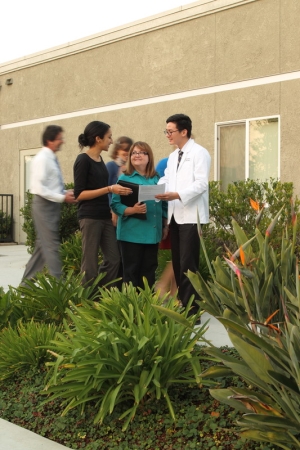Team Trojan Learns Value of Collaborating to Enhance Patient Care
July 19, 2013 / by Kukla Vera- Research
Ninety-one-year-old Filomena Flores is welcoming a very special group of USC students into her home. Although her visitors come from seven different professional programs spanning the university— dentistry, medicine, occupational therapy, pharmacy, physical therapy, physician assistant practice and social work—they arrive as a team. Under the guidance of an accompanying faculty mentor, this meeting is the first of a series aimed at teaching students to work collaboratively as they examine the health issues facing Flores and identify ways to improve her care.
The complexities of 21st century health care demand interdisciplinary teamwork to accelerate optimal patient outcomes. In typical Trojan fashion, schools across the university are working together to provide USC students with the education and experiences needed to become experts both in their own fields and in collaborating with other specialists. The Interprofessional Geriatrics Curriculum (IPGC)—the program bringing these students to Flores’ home—achieves that while also helping low-income senior citizens who suffer chronic illness.
“Comprehensive geriatric care is best given by an interprofessional team,” says Jo Marie Reilly, co-director of the Keck School of Medicine Primary Care and Community Medicine Program.
Brad Williams, professor at the School of Pharmacy, adds, “It’s also a great way to teach students how to function on an interprofessional team and to understand the expertise from each discipline and how they inform each other.”
Williams and Reilly are among the IPGC faculty mentors who advise students as they prepare to interact with patients and obtain the information necessary for creating a management plan that meets the multi-layered, complex health needs of the elderly.
Phuu Pwint Han, assistant professor of Clinical Dentistry at the Ostrow School of Dentistry, goes even further in describing the IPGC’s importance, calling it “our future health care model.” Like the other schools at USC, the Ostrow School provides a number of off-campus opportunities for interdisciplinary care, including service at the Hollenbeck Palms Skilled Nursing Facility, the Union Rescue Mission and the JWCH Institute’s Center for Community Health Downtown.
“Medical care is now too complex to be handled by just one provider,” says Freddi Segal-Gidan, gerontologist and assistant clinical professor in the Primary Care Physician Assistant Program at the Keck School of Medicine.
Segal-Gidan also mentors students assigned to clinical rotations at the USC-affiliated Rancho Los Amigos National Rehabilitation Center, where she serves as a staff physician associate. She says students enjoy “getting to know each other as future health professionals and developing not only an understanding of their various roles, but also personal connections that they can use beyond the IPGC.”
Pharmacy student Brian Chou agrees.
“This is really a great way to understand what other professions provide,” he says. “Each team member is able to elicit certain information that pertains to their respective profession, which collectively reveals pertinent medical and occupational issues.”
IPGC is one of many programs at USC supplying students with firsthand understanding of the importance of cross-disciplinary teamwork and the value each specialty brings to patient care.
Han observes, “All health professions are pushing toward the interdisciplinary care team model, and it is now a teaching requirement for most of us.”
The program’s benefits go far beyond the invaluable professional preparation it provides.
“We’re reaching out to some of our most vulnerable citizens here,” says Cheryl Resnik, associate chair and director of community outreach for the Division of Biokinesiology and Physical Therapy. “These students’ service to the community gives them an education nearly as vital as the techniques of working together to optimize people’s health.”
Other faculty members spearheading this program include Ashley Halle, an assistant professor of clinical occupational therapy, and Maria Aranda, an associate professor at the USC School of Social Work and core faculty of the USC Edward R. Roybal Institute on Aging.
Flores—one of those community members—would agree. As students complete their first session with her, she holds the hands of two team members. “I look forward to our next meeting,” she says.
To reference the work of our faculty online, we ask that you directly quote their work where possible and attribute it to "FACULTY NAME, a professor in the USC Suzanne Dworak-Peck School of Social Work” (LINK: https://dworakpeck.usc.edu)
